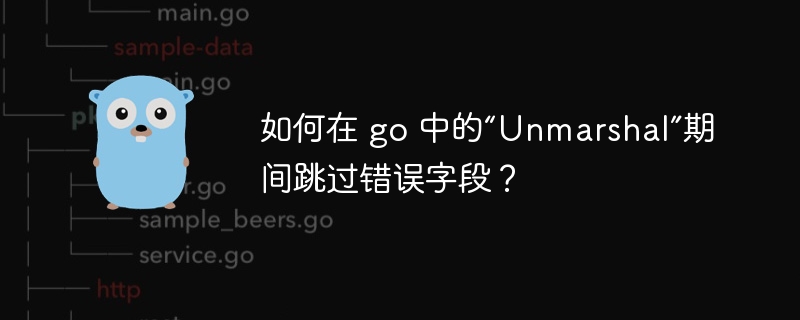How to skip error fields during 'Unmarshal' in go?

In the process of JSON deserialization (Unmarshal) using Go language, sometimes we may encounter some error fields that cannot be processed. These error fields may cause the program to terminate, affecting the normal execution of the code. So, is there any way we can skip these error fields during the Unmarshal process? The answer is yes. This article will introduce you to how to use some techniques in the Go language to skip error fields encountered during Unmarshal. Let's continue reading.
Question content
I am using json.Unmarshal(body, outputStruct) to convert a byte array into a structure. Errors may occur during unmarshalling.
For example, the structure is:
type Item struct {
Price float64 `json:"price"`
Quantity int `json:"quantity"`
}
If I pass quantity as a floating point value instead of an integer, it throws an error. I want to know how to unmarshal only valid fields and skip fields with errors?
So if I unmarshal a json:
{ price: 10, quantity: 2.5 }
I just want to get the price value from the structure but leave the quantity as the initial default value.
Solution
You can't.
If your JSON contains floats, you cannot unmarshal them to ints at all. you must:
- Use float64 and handle non-integers in code after unmarshalling
- Write your own UnmarshalJSON for your type
- Perform a two-step unmarshalling, once ignoring (
"-")Quantityso that it doesn't fail and only do the second unmarshaling of the Quantity (the new structure) group and ignore errors.
2 is the "best" way, but I'm not sure what's the logic behind "skipping fields of wrong type"? If quantity is 2.5, what will be the value of quantity? 0? Why?
The above is the detailed content of How to skip error fields during 'Unmarshal' in go?. For more information, please follow other related articles on the PHP Chinese website!

Hot AI Tools

Undresser.AI Undress
AI-powered app for creating realistic nude photos

AI Clothes Remover
Online AI tool for removing clothes from photos.

Undress AI Tool
Undress images for free

Clothoff.io
AI clothes remover

AI Hentai Generator
Generate AI Hentai for free.

Hot Article

Hot Tools

Notepad++7.3.1
Easy-to-use and free code editor

SublimeText3 Chinese version
Chinese version, very easy to use

Zend Studio 13.0.1
Powerful PHP integrated development environment

Dreamweaver CS6
Visual web development tools

SublimeText3 Mac version
God-level code editing software (SublimeText3)

Hot Topics
 Which libraries in Go are developed by large companies or provided by well-known open source projects?
Apr 02, 2025 pm 04:12 PM
Which libraries in Go are developed by large companies or provided by well-known open source projects?
Apr 02, 2025 pm 04:12 PM
Which libraries in Go are developed by large companies or well-known open source projects? When programming in Go, developers often encounter some common needs, ...
 What is the problem with Queue thread in Go's crawler Colly?
Apr 02, 2025 pm 02:09 PM
What is the problem with Queue thread in Go's crawler Colly?
Apr 02, 2025 pm 02:09 PM
Queue threading problem in Go crawler Colly explores the problem of using the Colly crawler library in Go language, developers often encounter problems with threads and request queues. �...
 What libraries are used for floating point number operations in Go?
Apr 02, 2025 pm 02:06 PM
What libraries are used for floating point number operations in Go?
Apr 02, 2025 pm 02:06 PM
The library used for floating-point number operation in Go language introduces how to ensure the accuracy is...
 In Go, why does printing strings with Println and string() functions have different effects?
Apr 02, 2025 pm 02:03 PM
In Go, why does printing strings with Println and string() functions have different effects?
Apr 02, 2025 pm 02:03 PM
The difference between string printing in Go language: The difference in the effect of using Println and string() functions is in Go...
 How to solve the problem that custom structure labels in Goland do not take effect?
Apr 02, 2025 pm 12:51 PM
How to solve the problem that custom structure labels in Goland do not take effect?
Apr 02, 2025 pm 12:51 PM
Regarding the problem of custom structure tags in Goland When using Goland for Go language development, you often encounter some configuration problems. One of them is...
 Why is it necessary to pass pointers when using Go and viper libraries?
Apr 02, 2025 pm 04:00 PM
Why is it necessary to pass pointers when using Go and viper libraries?
Apr 02, 2025 pm 04:00 PM
Go pointer syntax and addressing problems in the use of viper library When programming in Go language, it is crucial to understand the syntax and usage of pointers, especially in...
 Bytes.Buffer in Go language causes memory leak: How does the client correctly close the response body to avoid memory usage?
Apr 02, 2025 pm 02:27 PM
Bytes.Buffer in Go language causes memory leak: How does the client correctly close the response body to avoid memory usage?
Apr 02, 2025 pm 02:27 PM
Analysis of memory leaks caused by bytes.makeSlice in Go language In Go language development, if the bytes.Buffer is used to splice strings, if the processing is not done properly...
 Why do all values become the last element when using for range in Go language to traverse slices and store maps?
Apr 02, 2025 pm 04:09 PM
Why do all values become the last element when using for range in Go language to traverse slices and store maps?
Apr 02, 2025 pm 04:09 PM
Why does map iteration in Go cause all values to become the last element? In Go language, when faced with some interview questions, you often encounter maps...






